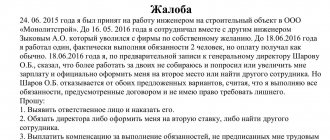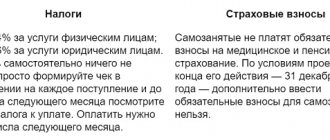Home / Labor Law / Responsibility / Material
Back
Published: 01/12/2018
Reading time: 9 min
0
8848
Fining is one of the most common methods of motivation used by employers in relation to their subordinates.
Numerous fines are taken for granted by both sides of the working relationship.
But is it legal? Let's find out!
- What does the law say about fining employees?
- Why do employers fine employees?
- What should a fined employee do?
- Employer's liability for fines to employees
- Alternative penalties
Dear readers! To solve your problem, call hotline 8 or ask a question on the website. It's free.
Ask a Question
Why are workers fined?
The areas of activity of different organizations differ, so there is no unified system of fines.
The most common reasons for foreclosure include:
- long absence from work without warning (more than three hours);
- premature departure;
- being late;
- dress code violation;
- complaints from customers;
- failure to implement the plan;
- use of official communication means for personal purposes.
Some employers use a detention system for violating internal regulations.
What the law says about the application of fines
The Labor Code of the Russian Federation does not allow the imposition of penalties that are not provided for by federal legislation and regulations on discipline. Penalties are not included in the list of disciplinary penalties.
Deductions from wages (Article 137 of the Labor Code of the Russian Federation) can be made in the following cases:
- refund of advance;
- reimbursement of overpaid amounts;
- refund for used but unfulfilled vacation.
The employer has the right to apply monetary penalties if damage to the organization's property is caused through the fault of an employee. Chapter 39 of the Labor Code of the Russian Federation regulates issues of financial liability of employees.
The legislation distinguishes between two types of property liability. Full financial liability implies recovery of the entire amount of damage. In this case, the employee signs a document in advance confirming full compensation for harm. If an agreement has not been concluded, the amount of deductions is limited to the amount of average monthly earnings (Article 241 of the Labor Code of the Russian Federation).
What other fine penalties may apply?
If fines are regularly imposed on employees, regulatory authorities may regard this as partial non-payment of wages. Criminal liability is applied if selfish or malicious intent is seen in the manager’s actions. And if such actions are observed for three months or more.
But some managers, fearing punishment, simply replace the concepts themselves. For example, they write about deprivation of bonuses. And the legislation does not describe situations with deprivation of bonuses. But such measures can also be considered illegal.
Article 192 of the Labor Code of the Russian Federation standardly describes three forms of penalties applied to employees. Among them:
- dismissal;
- rebuke;
- comment.
These forms do not imply an expanded interpretation on the part of employers. But non-payment of bonuses can be used if such a measure is described in internal documents.
Types of disciplinary sanctions
Article 192 of the Labor Code of the Russian Federation establishes the measures of influence that are applied when a disciplinary offense is committed.
The list of penalties that can be imposed on an employee includes:
- Comment.
- Rebuke.
- Dismissal.
For certain categories of workers, the legislation provides for additional types of punishment (for example, deprivation of the right to drive special vehicles).
The type of penalty in each specific case is determined by the essence of the violation.
A reprimand is the simplest form of punishment. It is used in cases of minor disciplinary offenses (for example, being a few minutes late) and is expressed verbally.
For violation (or failure to fulfill) official duties, the employee is reprimanded. Unlike a remark, the fact of a violation is recorded in writing (order or instruction).
The most serious punishment is dismissal.
Among the main reasons for dismissal, the Labor Code (Article 81) indicates:
- absenteeism (failure to appear or prolonged absence from work);
- repeated violation of labor duties (with a valid disciplinary sanction);
- showing up at work while intoxicated;
- loss of trust in the employee on the part of the employer.
Important! Dismissal for reasons that are not established by law is considered a gross violation.
The procedure for bringing an employee to disciplinary liability
In order for an employee to be held accountable, the head of the organization must take the following actions:
- Identify the fact of the offense and determine the guilt of a specific subordinate.
- Receive a written explanatory note from the employee. This document should describe the reasons for the incident, as well as the reasons for the subject's corresponding behavior.
If the explanatory note was not provided to the manager within two days from the date of the request, a corresponding act is drawn up.
- Within a month from the date of determination of the violation, the manager chooses the punishment.
- Within six months after the punishment is determined, the manager applies it in practice.
One offense entails only one type of liability. That is, an employee cannot be fired for the same offense without knowingly issuing a reprimand.
Deprivation of bonus
Article 192 of the Labor Code of the Russian Federation contains an exhaustive list of options for disciplinary punishment. The labor code does not provide for the possibility of monetary penalties. Many employers use deprivation of bonuses (deprivation of bonuses) as punishment for employees.
Read also: How to obtain the title of “veteran of labor”
Salaries in most organizations consist of a base part (salary) and incentive payments (Article 129 of the Labor Code of the Russian Federation). The salary cannot be less than the minimum wage (minimum wage). The law does not regulate the payment of additional amounts.
In most organizations, the conditions for calculating bonuses are set out in local regulations (for example, in a collective agreement or in internal regulations). At the same time, the document includes a clause stating that material incentives are paid in the absence of disciplinary sanctions.
The presence of a bonus system provides the employer with the opportunity to fine employees legally. However, deprivation of the bonus must be motivated. If a conflict situation arises, the employer is obliged to confirm the fact of the violation.
Types of liability provided for violation of labor regulations
By concluding an employment agreement with the head of a company, a citizen certifies with his signature his voluntary consent to working conditions in a particular organization. Also, immediately after concluding an agreement, a newly hired employee must be familiarized with all local regulatory documents that set out the nuances of working conditions. Thus, a person must become familiar with:
- PVTR (internal labor regulations). This standard outlines the work schedule and rules of behavior that must be observed during the work process;
- job description, which specifies the employee’s responsibilities;
- standards regulating workplace safety, as well as personal safety of the subject.
All types of collections must be regulated by one of the regulatory documents. Thus, an employee can avoid liability by observing the following rules:
- start and finish the work day on time;
- appear at the organization sober, without signs of abuse of various intoxicating substances;
- If necessary, be sure to use personal protective equipment (PPE);
- strictly follow the labor safety instructions;
- perform the duties reflected in the job description within the prescribed period;
- notify the head of the department and enterprise about identified problems (for example, equipment malfunctions).
Deviation from these rules and violation of labor procedures entails consequences in the form of disciplinary liability. Based on Art. 192 of the Labor Code of the Russian Federation, there is an established list of punishments that the employer has the right to apply to his subordinates if they violate the work process.
Labor legislation also implies that the head of an organization has the right to independently determine, based on his professional judgment, which measure, proportionate to the violation, to apply in individual cases.
In particular, legal options to punish an employee are:
- Oral remark. It is considered the most loyal measure of punishment, since it is not formalized in a document and is advisory in nature. There are no consequences from the comment. It can be used when the employee’s actions, although they were unlawful, did not entail any consequences or losses.
- A written reprimand, as well as a reprimand entered into a personal file. This measure of liability, more serious than a reprimand, is expressed in writing and imposes some restrictions on the violator. It is understood that for a year from the date of the reprimand, the employee should not repeat such a violation, since repetition of such an experience may lead to dismissal.
- Dismissal. It is the most severe punishment. Can be used in the presence of a reprimand, as well as in the case of a primary violation, if it was extremely rude.
Employer's liability
Labor legislation prohibits the use of financial sanctions for disciplinary violations.
Employee fines may expose the organization to administrative liability. The following punishment is provided for non-compliance with the law (Administrative Code of the Russian Federation, Article 5.27, part 1):
- for individual entrepreneurs - a fine of up to 5,000 rubles;
- for officials (managers) - a fine of up to 5,000 rubles;
- for legal entities (organizations) - a fine of up to 50,000 rubles.
Regular application of penalties may lead to criminal prosecution of the perpetrators.
How can an employee protect his rights?
An employee has the right to demand compensation for material damage if deductions from his wages are made illegally.
If the employer refuses to resolve the conflict voluntarily, the employee may:
- contact the labor inspectorate;
- write a complaint to the prosecutor's office;
- file a claim in court.
The applicant must confirm the fact of the violation (for example, provide a payslip indicating deductions or a bank statement). If there is a clause in the employment contract regarding the deprivation of bonuses for violation of discipline, the employer’s actions are considered lawful.
If a company practices issuing “gray” salaries, it is almost impossible to prove the application of penalties.
In addition, the bonus implies payments from the organization’s profits. At the same time, the employer is not obliged to report to staff about the reasons for the deductions.
What is the legal deduction of wages under the labor code?
This type of “taking” money from your salary can be divided into three groups.
Mandatory retention
This is the money that the employer must deduct from your earnings and at the same time “not put in his pocket.” This includes personal income tax, which is 13% of the salary, and executive documents. Most often these are alimony, fines and damages.
Withholding wages at the initiative of the employer
As follows from Article 137 of the Labor Code of the Russian Federation, the employer has the right to withhold part of the worker’s salary, but only if:
- the employee did not repay the advance payment that was issued earlier;
- the employee must return unspent travel allowances to his employer;
- If the employer paid out excess wages, he has the right to deduct this amount in the next month.
Information! It is worth noting that even in the presence of the above reasons, the employee has the right to refuse fines and penalties, and if the employer does not agree to return the earnings, he has the right to go to court.
Often the amount is not so high that it would be worth hassling with courts and proceedings, so the employer can make concessions and pay the withheld funds. With regard to damage to the property of an enterprise or organization, the company must obtain written consent from the employee to pay in parts the material damage caused by deducting a certain amount from earnings. In addition, he himself has the right to choose the percentage that will be calculated. If written consent has not been received, the employer should go to court to obtain such consent. In addition, if the problem is resolved through litigation, the company can choose the percentage that will be deducted from wages.
Employee-initiated retention
It’s hard to believe, but the employee himself can insist on retention, and this is completely legal! In fact, this is very often practiced in Russia. For example, an employee has a mortgage or needs to pay union dues. In order not to get involved in repaying the loan and not miss the next payment date, he asks his employer to deduct and pay these repayment contributions.








